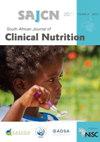If you drink alcohol, drink sensibly: a food-based dietary guideline for the elderly in South Africa
IF 0.6
Q4 NUTRITION & DIETETICS
引用次数: 0
Abstract
The use and misuse of alcohol has become a public health problem among the South African (SA) elderly population, among whom risky drinking is a common practice. Previous publications encouraging alcohol use have referred to two supposedly beneficial effects of alcohol, categorised as: (1) cardioprotective and haemostatic; and (2) promoting a positive balance in iron status. However, more recent evidence has weakened these assertions for all age groups as the disadvantages of alcohol use far outweigh these benefits. Some of these disadvantages can cause severe medical and physical harm to the elderly. Attempts to curb risky drinking among the SA elderly must be adopted through screening by clinicians during consultations, use of various screening and diagnostic tools available for addressing alcohol use and abuse, and exploiting the channels of alcohol exposure for appropriate interventions. Elderly populations are vulnerable to alcohol misuse irrespective of their consumption patterns or levels of use because of their ageing condition and the interaction of alcohol with medication. Therefore, there is a need to sensitise the SA elderly population on the risk posed by alcohol use, misuse or abuse, hence the FBDG ‘If you drink alcohol, drink sensibly’.如果你喝酒,就合理饮酒:南非老年人的饮食指南
酒精的使用和滥用已成为南非老年人的一个公共健康问题,在他们中间,危险饮酒是一种普遍做法。以前鼓励饮酒的出版物提到了酒精的两种据称有益的作用,分类为:(1)保护心脏和止血;(2)促进铁状态的正平衡。然而,最近更多的证据削弱了这些对所有年龄组的断言,因为饮酒的坏处远远大于好处。其中一些缺点会对老年人造成严重的医疗和身体伤害。必须通过临床医生在会诊期间进行筛查,使用各种可用于处理酒精使用和滥用的筛查和诊断工具,以及利用酒精暴露渠道进行适当干预,来遏制SA老年人的危险饮酒。由于老年人的老龄化状况以及酒精与药物的相互作用,无论其消费模式或使用程度如何,老年人都容易滥用酒精。因此,有必要提高南澳老年人对酒精使用、误用或滥用所造成的风险的认识,因此有必要制定《联邦饮酒准则》,即“如果你喝酒,就要理智地喝酒”。
本文章由计算机程序翻译,如有差异,请以英文原文为准。
求助全文
约1分钟内获得全文
求助全文
来源期刊

South African Journal of Clinical Nutrition
NUTRITION & DIETETICS-
CiteScore
2.50
自引率
9.10%
发文量
21
期刊介绍:
1.The Journal accepts articles from all basic and applied areas of dietetics and human nutrition, including clinical nutrition, community nutrition, food science, food policy, food service management, nutrition policy and public health nutrition. 2.The Journal has a broad interpretation of the field of nutrition and recognizes that there are many factors that determine nutritional status and that need to be the subject of scientific investigation and reported in the Journal. 3.The Journal seeks to serve a broad readership and to provide information that will be useful to the scientific community, the academic community, government and non-government stakeholders in the nutrition field, policy makers and industry.
 求助内容:
求助内容: 应助结果提醒方式:
应助结果提醒方式:


